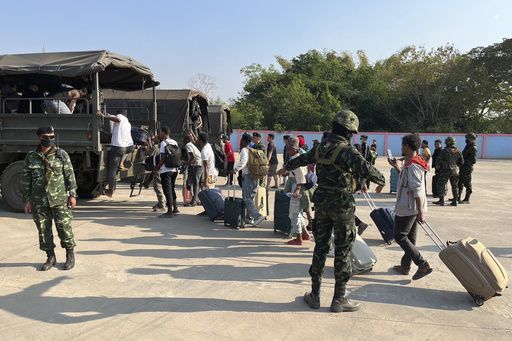BANGKOK — On Thursday, the Thai army announced plans to repatriate around 260 individuals believed to have been trafficked and forced to work in online scam operations, following their rescue from Myanmar. This initiative is part of a broader effort to dismantle the networks of scam centers that have taken root in Southeast Asia.
According to reports, the Thai army is coordinating the repatriation of these individuals after they were transferred from Myanmar to Thailand. Countries such as Myanmar, Cambodia, and Laos have become notorious for harboring criminal organizations that have coerced numerous people into engaging in various online fraud activities, including deceptive romantic schemes, fake investment opportunities, and illegal gambling operations.
U.N. experts estimate that these scams have cost victims around the globe tens of billions of dollars, with many recruited for these jobs under misleading circumstances, resulting in a form of virtual servitude. A crackdown on scam operations in Myanmar commenced in late 2023 following China’s worries over illegitimate casinos and scams in Myanmar’s Shan state, leading to ethnic guerrilla groups, closely allied with Beijing, shutting down numerous operations. Approximately 45,000 Chinese individuals believed to be involved were subsequently repatriated.
The army indicated that the individuals rescued in the recent operation represent 20 different nationalities, with considerable numbers hailing from countries such as Ethiopia, Kenya, the Philippines, Malaysia, Pakistan, and China. Others include nationals from Indonesia, Nepal, Taiwan, Uganda, Laos, Brazil, Burundi, Tanzania, Bangladesh, Cambodia, Sri Lanka, Nigeria, Ghana, and India. On Wednesday, these individuals were moved across the border from Myanmar’s Myawaddy district to Thailand’s Tak province.
Thai media outlets reported that the Democratic Karen Benevolent Army, an ethnic militia controlling the area where these individuals were held, was instrumental in their release and transport to the border. Myanmar’s military regime has limited authority over various frontier regions inhabited by ethnic minorities, and several such militias are believed to be engaged in criminal activities, including drug trafficking and the protection of scam call centers.
The rescued individuals will be interrogated to confirm their status as victims of trafficking. If validated, they will enter a protective process while arrangements are made for their return to their home countries. Deputy Prime Minister Phumtham Wechayachai, who is also the defense minister, mentioned that Thailand expects potentially more scam victims awaiting repatriation but intends to prioritize those ready for immediate return.
Phumtham emphasized that Thailand is not planning to establish additional shelters for these individuals, noting that the country already hosts nine refugee camps that accommodate over 100,000 people, mainly from Myanmar’s ethnic Karen community. He also stated the importance of questioning the rescued individuals to ensure their status is accurately determined and to gather information that could assist law enforcement in addressing trafficking and scam activities.
On a visit to China in early February, Thailand’s Prime Minister Paetongtarn Shinawatra committed to working alongside Chinese leader Xi Jinping to combat the scam networks disrupting the region. There have been numerous harrowing accounts of Chinese nationals being deceived into working in Bangkok, only to find themselves trafficked into scam operations in Myanmar. A notable case involved Chinese actor Wang Xing, who gained attention on social media but was quickly rescued.
To address these concerns, Liu Zhongyi, China’s Vice Minister of Public Security, visited Thailand last month, inspecting areas near the border where many Myanmar-based scam centers operate. Just before Paetongtarn’s trip to China, the Thai government issued an order to cut off utilities such as electricity, internet, and gas to specific regions in Myanmar adjacent to northern Thailand, citing national security and the severe repercussions of scam activities on Thailand.
The Thai government is considering extending this measure to northeastern areas bordering Cambodia, as stated by Thai Defense Ministry spokesperson Thanathip Sawangsang, who noted that officials have already disconnected illegal internet installations in those regions.




